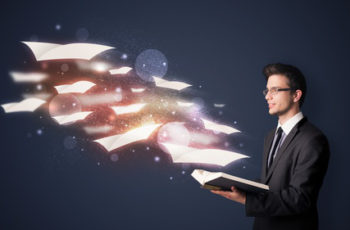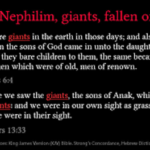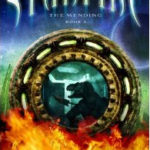Christian speculative fiction, as a whole, has evolved along distinct lines from secular speculative fiction, acquiring its own hallmarks and characteristics. There are many reasons for this, too many to explore or even list; different cultural pressures, different audience demands, even the division between Christian and regular literature (did it  exist a hundred years ago?) all played their parts. Another cause, and the one I want to focus on today, is that Christianity itself – so much the intellectual and cultural background of these works – introduces different elements into fiction. The handling of these elements may or may not accord with Christian thought and biblical exegesis, but the source of the material is beyond doubt. Here, then, are a few of these elements:
exist a hundred years ago?) all played their parts. Another cause, and the one I want to focus on today, is that Christianity itself – so much the intellectual and cultural background of these works – introduces different elements into fiction. The handling of these elements may or may not accord with Christian thought and biblical exegesis, but the source of the material is beyond doubt. Here, then, are a few of these elements:
Angels/demons. Many different cultures and religions harbor ideas of angels and demons, and then there are free-floating, popular notions – for example, the belief (unattached to any actual religion) that people die and become angels. What Christianity provides, then, is not the general idea of angels but a specific idea of who and what they are. The two greatest representations of angels and demons in modern Christian fiction are Peretti’s This Present Darkness and Lewis’ The Screwtape Letters. There have been many others, all containing variations of their own. But one great commonality cuts across all Christian portrayals of demons and angels: They are always dedicated to the service of either Heaven or Hell; never do they act as free agents. In Christian SF, angels never exist without God and rarely exist without the devil. Christian doctrine on angels is so established, and so developed, that it encourages the use of angels in Christian SF – far more prodigious than in secular SF.
The Nephilim. The Nephilim appear only briefly in the Bible, but long enough to stir up all kinds of controversy. Various interpretations of what they were have been put forward, some quite tame. Naturally, the wild interpretations have gotten a foothold in Christian SF. Half-demon supermen are rich material for fantastic novels, and this is obvious even if you are one of those Christians who are just driven crazy by the whole phenomenon. Nephilim stories are unusually bound to our own world and history, especially to (borrowing a phrase) the days of Noah and the days of the Son of Man. The incubus is made in a similar mold, but it inhabits a different milieu than the Nephilim and lacks the absolute identification with angels and the Bible.
The End Times. To speak of the End Times as the end of the world is accurate but desperately incomplete. The language of the End Times, both revolutionary and catastrophic, makes it clear that it will be the end of the world, the universe, and the current cosmic order. So when Christians use the term End Times, they aren’t whistling Dixie. The End Times have become an established niche in Christian fiction, inspired by the stormy visions of Revelation and driven by Christian enthusiasm (periodically intense, never entirely dormant) for the subject. Left Behind carries the field, but C.S. Lewis’ The Last Battle entered it more than sixty years ago, and newer books carry on the charge.










































One thing that sort of bugged and confused me when I first started watching anime was that many of the Japanese creatures, such as yokai, were translated to ‘demon’ on many occasions, never mind that yokai aren’t anything like demons. But then I guess as time went on I realized that other cultures might actually traditionally use the word demon, but it means something different than in Christianity. I still disagree with the translation in application to most Japanese creatures, though. In fact, I don’t know why they bother translating it at all. If they’re yokai, just call them yokai.
I find that this issue even affects how anime writes demonic chars that should be more in line with Christianity, though. There’s that whole ‘devouring human souls’ trope, for instance. It’s interesting, but typical at this point. As you said, following reasonably close with what the Bible implies about demons and angels actually makes for a more unique story in many cases.